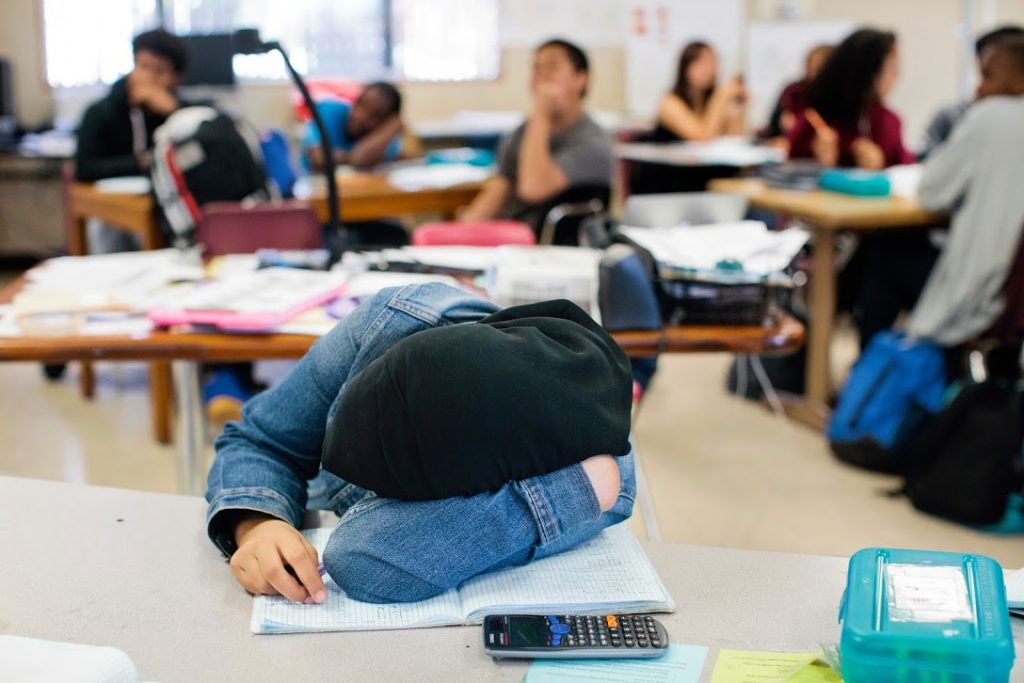
Black teachers: How to recruit them and make them stay

Lessons in higher education: What California can learn

Keeping California public university options open

Superintendents: Well-paid and walking away

The debt to degree connection

College in prison: How earning a degree can lead to a new life

A ban on starting regular school classes earlier than 8:30 a.m. in all California middle and high schools will come up for a vote next month in an Assembly committee.
The bill passed the Assembly Education Committee last week and must clear the Assembly Appropriations Committee before it goes to the full Assembly. If passed and signed by the governor, the bill would make California the first state in the country to adopt a ban on early start times in secondary schools.
In May, the Senate approved the bill in a 23-13 vote. SB 328 was sponsored by Sen. Anthony Portantino, D–La Cañada Flintridge.

State Sen. Anthony Portantino
Portantino and supporters of the proposed law say it is necessary because it addresses public health concerns related to adolescent sleep deprivation, including suicide, depression, and car accidents involving teens. Medical research shows that teens have difficulty falling asleep early in the evening and functioning well in the morning, Portantino and others told the Assembly Committee on Education last Wednesday.
If passed, the bill wouldn’t go into effect for two years, to give schools and districts time to plan for it. Small, rural districts could apply for waivers for up to two years, if the new law would pose a hardship for them.
The bill is supported by the American Academy of Pediatrics, California State PTA, American Academy of Sleep Medicine, California Federation of Teachers, California Sleep Society and several hospitals, school districts and student advocacy groups. Advocates who spoke at the Assembly Education Committee hearing included Sen. Richard Pan, D-Sacramento, who is a pediatrician.
“The science is sound,” he said. “We need to do this for the benefit of our kids.”
Opponents include the California School Boards Association, California Teachers Association and California Association of School Business Officials. Nancy Chaires Espinoza, a legislative advocate for the California School Boards Association, was among those who spoke against the bill at the Assembly Education Committee hearing, saying local school boards should be the ones deciding start times for their schools, not the state.
Chaires Espinoza said later start times may require additional buses and drivers and some districts may not have funding for them.
She also speculated that many teens may not get more sleep anyway, since their parents might not be able to adjust their work days and would have to just drop kids off early.
The bill would not apply to so-called optional “zero period” classes, which take place before the regular school day begins and add an extra period to a student’s day. However, it would include charter schools, the committee said.
A rundown of nearly a dozen bills being followed by EdSource is here.

Part-time instructors, many who work for decades off the tenure track and at a lower pay rate, have been called “apprentices to nowhere.”

A bill to mandate use of the method will not advance in the Legislature this year in the face of teachers union opposition.

Nearly a third of the 930 districts statewide that reported data had a higher rate of chronic absenteeism in 2022-23 than the year before.

The move puts the fate of AB 2222 in question, but supporters insist that there is room to negotiate changes that can help tackle the state’s literacy crisis.
Comments (3)
Comments Policy
We welcome your comments. All comments are moderated for civility, relevance and other considerations. Click here for EdSource's Comments Policy.
Paul Muench 7 years ago7 years ago
Why do later start times need state wide support? In the era of local control we need an answer to this question.
Replies
Theresa Harrington 7 years ago7 years ago
That is part of the debate around this bill. Currently, there is nothing stopping local school boards from adopting later start times. However, Sen. Portantino and the bill's supporters believe the state needs to mandate it because it is a public health issue. He also said some local district leaders said it would be easier to move start times later if neighboring districts did it also, to better align sports and other shared schedules. And … Read More
That is part of the debate around this bill. Currently, there is nothing stopping local school boards from adopting later start times. However, Sen. Portantino and the bill’s supporters believe the state needs to mandate it because it is a public health issue. He also said some local district leaders said it would be easier to move start times later if neighboring districts did it also, to better align sports and other shared schedules. And one district leader said it’s sometimes easier for local boards to implement things like this if the state mandates it, since it’s impossible to please all local constituents when altering start times, no matter when they are.
Paul Muench 7 years ago7 years ago
I think even without a detailed study I can comfortably say that a significant majority of teenagers are NOT committing suicide. Is there really no other options for at risk students? This law really seems like overkill.